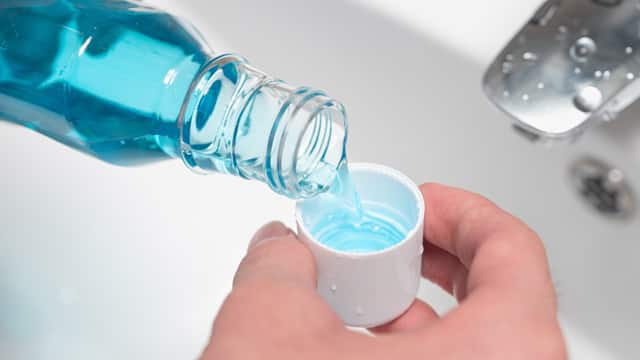Location and Function
You have six main glands (three on each side of your mouth) that continually produce saliva. The parotid glands secrete saliva into your mouth above your upper molars. In contrast, the submandibular glands use ducts in your jaw beside your lower molars, and the sublingual glands empty saliva underneath your tongue.
Enzymes in saliva start the digestive process as soon as you chew your food. Without saliva to lubricate and soften food, chewing and swallowing is difficult. Saliva also keeps your mouth moist so that you can easily speak. Another key function of saliva is to wash harmful bacteria off your teeth and lower the acidity level in your mouth, helping to prevent tooth decay and gum disease. In addition, the calcium, phosphorus, and fluoride found in saliva help repair enamel.
What Is Saliva Made Of?
A healthy person produces 600 milliliters of saliva every day, and approximately 99 percent of that saliva is water. The remaining 1 percent contains a multitude of components, such as sodium, calcium, magnesium, potassium, immunoglobulins, proteins, enzymes, and mucins. These components of saliva, while only a tiny percentage of it, serve unique functions that are central to sustaining your health.
- Proteins: The second leading component of saliva after water. Though proteins make up only a fraction of saliva's composition, they serve numerous functions. Proteins work as the first line of defense in eliminating oral bacteria and help form a protective layer on your teeth. They are thought to aid in taste by interacting with taste receptors in your mouth.
- Enzymes: The enzymes found in saliva are specific proteins responsible for sparking chemical reactions in your body that help begin the digestive process. For example, these enzymes assist in breaking down starches and fats in your mouth.
- Mucin: You might equate mucin to the buildup of mucus that happens when you get a cold, but the mucin found in saliva aids in digestion. This specific protein helps you eat and swallow safely by keeping the mouth lubricated.
- Electrolytes: Electrolytes are minerals in your body, such as calcium, phosphorous, and magnesium. Inside your mouth, these particular minerals help strengthen and harden your enamel, which in turn helps reduce your risk of cavities.
How to Keep Your Salivary Glands Healthy
Follow these simple tips to keep your salivary glands healthy and productive:
- Avoid smoking and tobacco products.
- Limit alcohol intake and don't use recreational drugs.
- Closely monitor any health conditions, like diabetes.
- Notify your doctor if a prescribed medication dries your mouth.
- Talk to your doctor about solutions for snoring or breathing through your mouth at night.
- Maintain a good oral hygiene routine to reduce bacteria in the mouth.
- See your doctor whenever you have signs of infection in your mouth or swollen salivary glands.
- Stay hydrated by drinking lots of water throughout the day.
What Is Dry Mouth?
When your glands don't produce enough saliva to keep your mouth comfortably moistened, you may have xerostomia, more simply known as dry mouth. Everyone experiences dry mouth occasionally, especially when nervous or stressed. But many people experience dry mouth frequently due to medication side effects or more serious complications that interfere with saliva production. Symptoms of dry mouth include difficulty chewing, changes in taste, a burning sensation throughout the mouth, mouth sores, and cracked lips.
More than 500 medications (over-the-counter and prescription) can cause dry mouth or increase its severity. Decongestants and antihistamines are common culprits, and some antidepressants, blood pressure medications, sedatives, antispasmodics for cramps, and antipsychotics for anxiety can also cause dry mouth.
Drugs used to treat Parkinson's disease and prevent nausea and vomiting during chemotherapy or radiation treatment may also trigger dry mouth.
To lessen the symptoms of dry mouth, sip water throughout the day and avoid smoking and drinking beverages with caffeine or alcohol. To stimulate more saliva flow, chew sugarless gum, suck on sugarless candies or use a saliva substitute recommended by your doctor.
Other Conditions That Affect Saliva Production
Sjogren's syndrome is an autoimmune disease that affects the salivary glands and may cause dry mouth or mouth sores. Dry mouth is a symptom associated with HIV, Parkinson's disease, and diabetes. Chemotherapy can sometimes make the mouth feel dry because the saliva becomes thicker.
A salivary gland infection can occur due to dehydration, chronic illness, or blockage from a salivary stone duct. Smoking or poor oral hygiene can also result in a bacterial infection of a gland.
Mumps is a viral infection that most often affects the parotid gland. Besides dry mouth, symptoms of a gland infection may include:
- Fever
- Redness on the cheeks or neck
- Swelling or pain in the upper neck or side of the face and difficulty opening the mouth
See a dental professional if you are concerned about a salivary gland infection or another condition affecting your body's ability to produce saliva. Remember, a wet mouth is a healthy mouth, and salivary glands are the key.
This article is intended to promote understanding of and knowledge about general oral health topics. It is not intended to be a substitute for professional advice, diagnosis or treatment. Always seek the advice of your dentist or other qualified healthcare provider with any questions you may have regarding a medical condition or treatment.
ORAL HEALTH QUIZ
What's behind your smile?
Take our Oral Health assessment to get the most from your oral care routine
ORAL HEALTH QUIZ
What's behind your smile?
Take our Oral Health assessment to get the most from your oral care routine






.jpeg)








